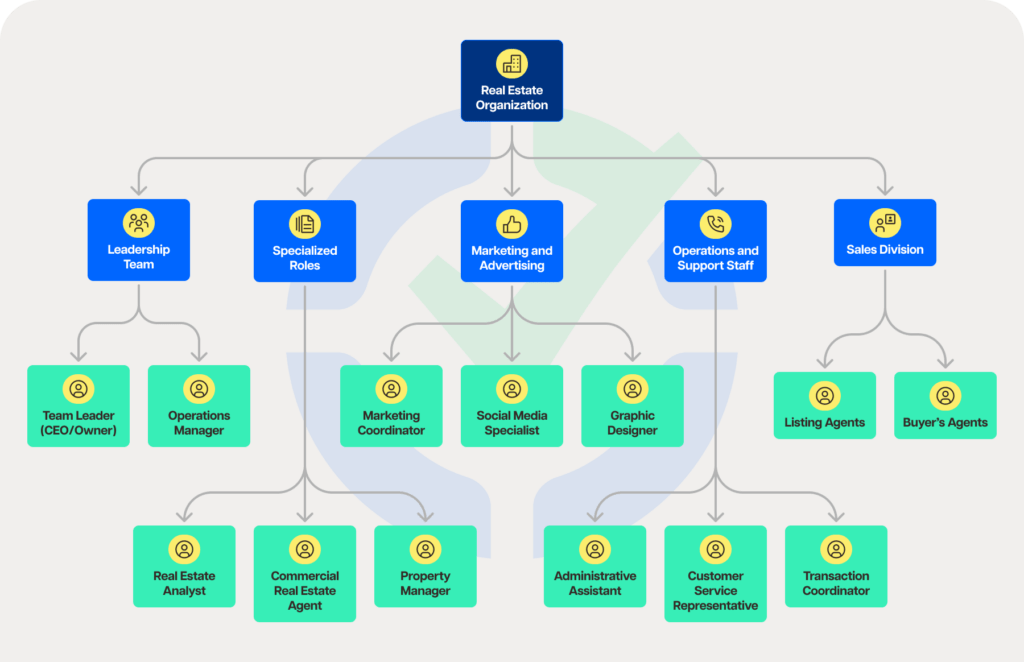Having a well-functioning team structure is crucial in the real estate industry, where every transaction involves a delicate dance between the buyer and seller. Creating an experience and a journey that clients will remember and recommend is as important as making business. This blog post delves into the complexities of developing a successful real estate team structure, highlighting its significance, essential elements, and a model structure to help you succeed in the field.
Table of Contents
- Key components of a real estate team structure
- Sample real estate team structure
- Benefits of an efficient team structure
- Challenges and solutions
Key components of a real estate team structure
It is crucial to comprehend the roles and duties that make up a real estate team in order to construct a strong one. Every team member, from administrative assistants to sales representatives, brings a distinct skill set to the table. A varied skill set guarantees that the team can efficiently adjust to different situations and meet the needs of a wide range of clients.

Sample real estate team structure
A typical real estate team structure consists of several key roles:
Team leader
Positioned as the captain, the team leader charts the route and steers the ship through the difficulties presented by the real estate market. The team leader motivates and directs the group toward success by combining industrial knowledge and leadership abilities.
Sales agents
As the team’s public face, these front-line workers engage with customers directly to streamline transactions. Buyers’ agents and sellers’ agents are examples of specializations that guarantee clients receive individualized attention based on their needs.
Marketing and advertising
In the era of digital technology, marketing is essential for drawing in customers and presenting properties. Creating effective campaigns and reaching out to potential buyers and sellers through a variety of channels is the responsibility of the marketing staff.
Administrative support
A committed administrative team that makes sure everything runs well is the driving force behind any successful team. Administrative help keeps everything running smoothly, from scheduling to handling paperwork.
Transaction coordinator
The team’s pivotal member, the coordinator, is in charge of all aspects of the transaction, from contract to close. Efficiency and client satisfaction are guaranteed by their organizational abilities and attention to detail.
Technology and support staff
Technology is essential for optimizing client experiences and reducing procedures in an increasingly digitalized economy. By keeping the team up to date with technology changes, IT support personnel maximize productivity and efficiency.
Training and development
The key to success in the real estate industry is ongoing education. To keep team members up to date on industry trends and best practices, a dedicated training coordinator or mentor is employed by the team to coordinate continuing training sessions.

Benefits of an efficient team structure
An efficient real estate team structure yields a multitude of benefits, including:
- Improved productivity and efficiency through streamlined workflows and optimized resource allocation.
- Enhanced customer satisfaction through personalized service, timely communication, and seamless transaction experiences.
- Increased profitability through attaining business objectives, including higher sales volumes and client retention rates.
Challenges and solutions
Despite its many benefits, building and maintaining an efficient real estate team structure comes with its challenges.
Communication breakdowns
Any real estate team’s ability to work together smoothly depends on effective communication. However, a number of reasons, including misreading messages, competing goals, or insufficient avenues for communication, can lead to communication breakdowns.
Real estate teams can use tactics including holding frequent team meetings, using communication tools for in-the-moment updates, and creating explicit guidelines for information sharing to overcome this difficulty. Teams may improve cooperation, reduce miscommunication, and guarantee goal alignment by cultivating open lines of communication.
Resource constraints
Real estate teams frequently deal with resource limitations, such as tight budgets, a lack of personnel, or time restraints. These limitations may prevent productivity gains and the accomplishment of corporate goals. Teams can take proactive steps to get around resource constraints.
These include using technology to automate repetitive operations, outsourcing non-core activities to freelancers or third-party vendors, and prioritizing tasks based on impact and urgency. Furthermore, encouraging an innovative and resourceful culture within the team can inspire original thinking to get around resource limitations and produce outcomes.

Resistance to change
Real estate teams that are trying to adjust to new technology, market trends, or operational procedures may find it difficult to overcome resistance to change in a sector that is changing quickly. Fear of the unknown, inertia, or the belief that current workflows are in danger can all be causes of resistance to change.
To overcome this difficulty, team leaders should actively involve their members in the change management procedure by asking for their opinions, listening to their worries, and stressing the advantages of implementing change. Reducing resistance and promoting an adaptable culture within the team can be achieved by offering sufficient training and assistance to manage transitions, acknowledging accomplishments, and presenting measurable results.
Real estate teams can overcome obstacles, improve operational efficiency, and position themselves for long-term success in a competitive market landscape by proactively addressing these issues and putting solutions into practice, such as encouraging open communication, optimizing resources, and embracing change.
Conclusion
Success in the dynamic real estate market depends more on creating enduring connections and providing outstanding experiences than it does on merely closing transactions.
Real estate professionals can enhance their performance, surpass client expectations, and prosper in a competitive market by allocating resources toward establishing an effective team structure. As you set out on your real estate career, keep in mind that your success is based on the strength of your team.

Andy is a technology & marketing leader who has delivered award-winning and world-first experiences.


